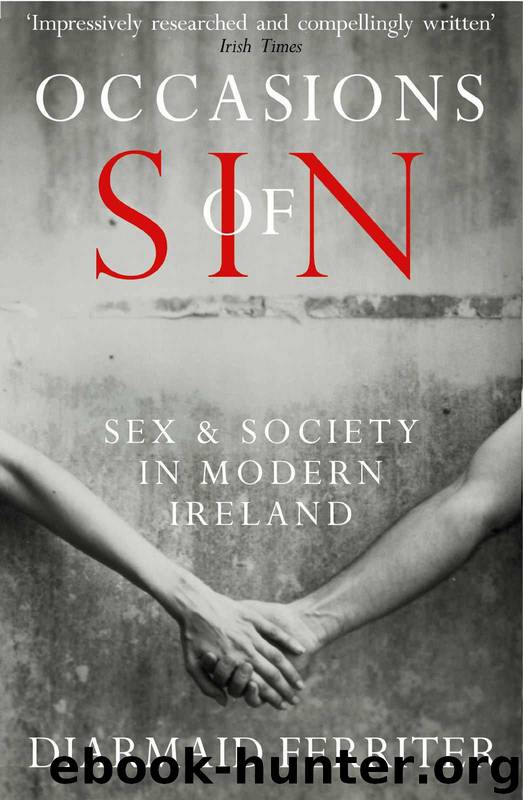Occasions of Sin: Sex and Society in Modern Ireland by Ferriter Diarmaid

Author:Ferriter, Diarmaid [Ferriter, Diarmaid]
Language: eng
Format: mobi, azw3
Publisher: Profile Books UK
Published: 2010-07-08T23:00:00+00:00
‘Upright citizens,
capable of spotting dirt at a hundred yards’
The following decade, in the most shameful episode of bullying in Irish theatre history, reputations, careers and a marriage were ruined by the decision to prosecute Alan Simpson, the director of the tiny Pike theatre in Dublin, for staging Tennessee Williams’ 1952 play The Rose Tattoo. The myth that a condom featured on the stage endured for years afterwards; in fact there was no condom. The real reasons the production received such unwelcome attention was because of the battle between state and Church over who was seen to be doing the most in relation to the censorship of perceived unsuitable material. This was not about the play at all, the Minister for Justice apparently being pressured to close it before being called upon by Archbishop McQuaid to do so. A letter from the Attorney General’s office in May 1957 states that the minister had been approached by a TD about the staging of this ‘unquestionably indecent’ play, ‘that its production had been prohibited in several American cities’, and that delays in closing it would result in the Archbishop intervening.
A civil servant advised the minister that he should not put himself in a position in which the impression was given that ‘you act only at the dictation of the Archbishop or somebody else’.322 Later in the month, two Gardaí attended the play and reported on ‘lewd, vulgar and offensive’ matters (despite the fact that ‘a better class of audience attended’, including well-known members of the political and legal establishment), such as 15-year-old Rossa Delle Rose dancing with an American soldier; she was ‘close to her partner and sways with his rhythm’. Director Alan Simpson was eventually arrested; however, a district court judge refused to let the issue go to trial, and castigated the Garda case. The theatre never recovered, nor did Simpson’s marriage to Carolyn Swift, who founded the theatre with him; she spent the last few years of her life working on a book about the case with co-author Gerald Whelan.323
This case was not about public indecency; it is no coincidence that it happened at the same time as the row over the Censorship of Publications Board described earlier. In the words of Fintan O’Toole, ‘Simpson and Swift were simply picked up by the state, crumpled like pieces of used paper and tossed aside.’324 Simpson used to joke that ‘we died so that Irish theatre could be free’. There is an element of truth in that, and the price they paid was high.
Censorship had a continuing relevance for libraries, also. Dermot Foley, librarian in Ennis, County Clare, recalled that the suspicion created by the Censorship Board about public libraries meant that ‘every two-bit prude or bigot could fancy himself or herself a moral policeman’. In one library the poetry of John Donne was locked up in a case with other books available on request only to ‘readers of proven maturity of mind’. Foley also encountered ‘a panel of spiritual vigilantes who would vet all books before they could be placed in the library’.
Download
Occasions of Sin: Sex and Society in Modern Ireland by Ferriter Diarmaid.azw3
This site does not store any files on its server. We only index and link to content provided by other sites. Please contact the content providers to delete copyright contents if any and email us, we'll remove relevant links or contents immediately.
Rewire Your Anxious Brain by Catherine M. Pittman(18655)
Talking to Strangers by Malcolm Gladwell(13370)
The Art of Thinking Clearly by Rolf Dobelli(10489)
Mindhunter: Inside the FBI's Elite Serial Crime Unit by John E. Douglas & Mark Olshaker(9343)
Becoming Supernatural by Dr. Joe Dispenza(8217)
Change Your Questions, Change Your Life by Marilee Adams(7783)
Nudge - Improving Decisions about Health, Wealth, and Happiness by Thaler Sunstein(7707)
The Road Less Traveled by M. Scott Peck(7603)
The Lost Art of Listening by Michael P. Nichols(7506)
Mastermind: How to Think Like Sherlock Holmes by Maria Konnikova(7347)
Enlightenment Now: The Case for Reason, Science, Humanism, and Progress by Steven Pinker(7313)
Win Bigly by Scott Adams(7199)
The Way of Zen by Alan W. Watts(6614)
Daring Greatly by Brene Brown(6514)
Big Magic: Creative Living Beyond Fear by Elizabeth Gilbert(5773)
Grit by Angela Duckworth(5615)
Ego Is the Enemy by Ryan Holiday(5450)
Men In Love by Nancy Friday(5240)
The Laws of Human Nature by Robert Greene(5208)
